
East Bank is a town in Kanawha County, West Virginia, United States, situated along the Kanawha River. The population was 820 at the 2020 census. East Bank was incorporated in 1889 by special charter enacted by the West Virginia Legislature. It is so named on account of the town's location on the east side of the Kanawha River.

Alum Creek is a census-designated place (CDP) in Kanawha and Lincoln counties along the Coal River in the U.S. state of West Virginia. It includes the unincorporated communities of Alum Creek, Forks of Coal, and Priestley. The CDP had a population of 1,749 at the 2010 census, down from 1,839 at the 2000 census.

William Alexander MacCorkle, was an American teacher, lawyer, prosecutor, the ninth governor of West Virginia and state legislator of West Virginia, and financier. His residence in Charleston, known as Sunrise, is listed on the National Register of Historic Places.

The James River and Kanawha Canal was a partially built canal in Virginia intended to facilitate shipments of passengers and freight by water between the western counties of Virginia and the coast. Ultimately its towpath became the roadbed for a rail line following the same course.

Buildings, sites, districts, and objects in Virginia listed on the National Register of Historic Places:
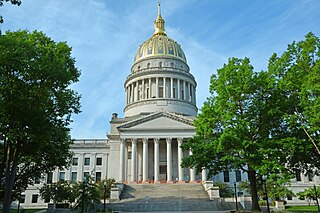
The West Virginia State Capitol is the seat of government for the U.S. state of West Virginia, and houses the West Virginia Legislature and the office of the Governor of West Virginia. Located in Charleston, West Virginia, the building was dedicated in 1932. Along with the West Virginia Executive Mansion it is part of the West Virginia Capitol Complex, a historic district listed on the National Register of Historic Places.
Institute is an unincorporated community on the Kanawha River in Kanawha County, West Virginia, United States. Interstate 64 and West Virginia Route 25 pass by the community, which has grown to intermingle with nearby Dunbar. As of 2018, the community had a population of 1,489, 54% of whom were African American.

Kanawha State Forest is a 9,300-acre (38 km2) recreation area located near the community of Loudendale, West Virginia, which is about 7 miles (11 km) from downtown Charleston, West Virginia, United States. It is managed by the West Virginia Department of Natural Resources.
Bulltown is an extinct town in Braxton County, West Virginia, United States. The GNIS classifies it as a populated place.
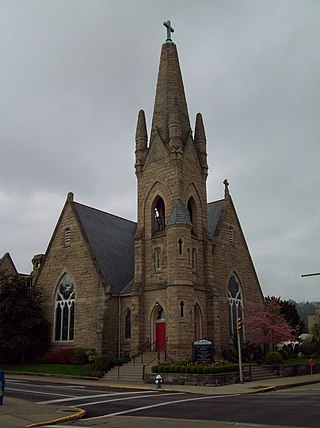
St. John's Episcopal Church is an historic Episcopal church located at 1105 Quarrier Street in Charleston, West Virginia, in the United States. On November 2, 1989, it was added to the National Register of Historic Places. It was also listed as a contributing property in the Downtown Charleston Historic District in 2006.
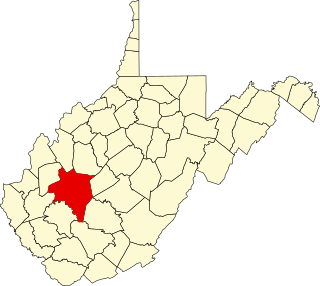
This is a list of the National Register of Historic Places listings in Kanawha County, West Virginia.
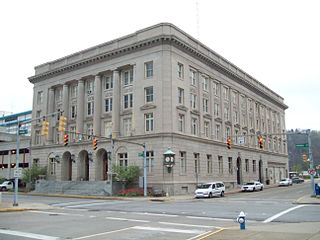
Charleston City Hall is a historic city hall located at Charleston, West Virginia. It was constructed in 1921 in the Neoclassical style. It is located opposite the Kanawha County Courthouse, at the center of downtown Charleston. The major, or entrance, elevation faces Virginia Street with monumental design features and walls clad in smooth gray limestone. The equally impressive limestone-faced Court Street facade presents a grand prospect which runs southward for nearly a block between Virginia Street and Kanawha Boulevard. These two elevations are entirely formal in design because they were intended to face the courthouse and principal city thoroughfare. The four-story building is centered with a colossal engaged colonnade of six fluted Doric columns, which rises three-stories in support of a massive cornice. The interior features a grand entrance lobby, and classically designed stairhall and council chambers.
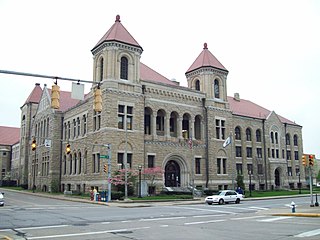
Kanawha County Courthouse is a historic courthouse located at Charleston, West Virginia. It is located across from the Charleston City Hall, and is a block-long structure constructed in 1892 of rock-face masonry.

African Zion Baptist Church is a historic Baptist church at 4104 Malden Drive in Malden, Kanawha County, West Virginia. It is within the Malden Historic District.

Sweet Springs Resort and spa was founded in Sweet Springs, West Virginia, United States in 1792. Once known as Old Sweet Springs, this historic resort hotel is currently undergoing renovation by the nonprofit Sweet Springs Resort Park Foundation. The property enjoys notoriety for its natural hot spring.

The West Virginia Capitol Complex is an 18-acre (7.3 ha) historic district located along Kanawha Blvd., E., in Charleston, West Virginia. It dates from 1925 and was listed on the National Register of Historic Places in 1974.
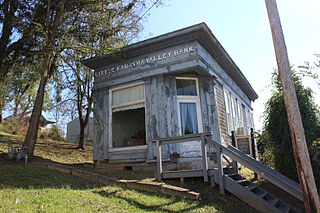
Little Kanawha Valley Bank is a historic bank building located at Glenville, Gilmer County, West Virginia. It was built in 1901 and is a small one-story commercial building with Classical Revival-style details. It is a rectangular frame building covered in pressed sheet metal. It was occupied by the Little Kanawha Valley Bank until 1916 when they moved to larger quarters.
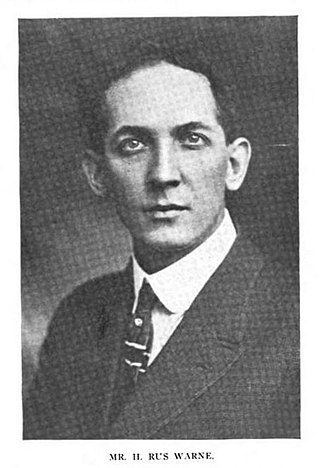
Harry Rus Warne was a Charleston, West Virginia-based architect.

Glen Ferris Inn, also known as Stockton's Inn, Stockton's Tavern, and Hawkins's Hotel, is a historic hotel located on the bank of the Kanawha River overlooking Kanawha Falls at Glen Ferris, Fayette County, West Virginia. It may have been built as early as 1815. It is a T-shaped brick building in two sections. One section is a three-story, painted brick dwelling. The second is a two-story, red brick wing measuring 140 by 40 feet. The building features a wraparound porch supported by 13 stuccoed brick columns. In the 19th century, the building was a stagecoach stop and served as a Union quartermaster's depot during the American Civil War. In the first half of the 20th century, it housed managers, supervisors, and workers involved in developing the area's manufacturing and hydro-electric capacity.

Booker T. Washington High School, also known as Grant Junior High School and Grant Elementary, is a historic high school building located near London, Kanawha County, West Virginia. It was built in 1925, and is a two-story, L-shaped wire brick building with a rear section in tile block and brick. It is in the Streamline Moderne style. It was built as a high school for African American children during the period of segregated educational facilities. After desegregation in 1956, it was used as a junior high school, then an elementary school. The school closed in June 1986, and is now used as a community center. It was one of two early high schools for African Americans in Kanawha County.




















